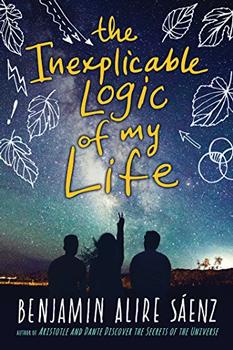Summary | Excerpt | Reviews | Beyond the Book | Read-Alikes | Genres & Themes | Author Bio

This article relates to The Inexplicable Logic of My Life
Grief is hard to deal with at any age, but Benjamin Alire Saenz's novel The Inexpliable Logic of My Life reminds us just how much harder it can be when on the cusp of adulthood, especially when it is caused by the loss of a parent. Sal, Sam, and Fito each experience the loss of a parent or loved one in a different way, and the relationship they each lose is different, which, for adult readers of the book, is a reminder that when adults talk to teenagers, especially when it comes to heavy, life-altering topics, there is not a one-size fits all solution, nor can the reality of a situation be sugarcoated. Teenagers know what's real: Sal watched the decline of his grandmother from within a large, loving family; Sam's contentious relationship with her mother did not lessen the impact of the drunk driving accident that took her life; Fito, though his mother was alive until she overdosed, was very aware that he had lost his mother long before, but it did not make the grief of the loss, nor the isolation from his family any easier.
The Dougy Center, a U.S.-based center for grieving children and families, identifies six principles that specifically define teen grief, and notes that most teens benefit more from adults who listen and act as companions, rather than those who try to control or direct the grieving process. Notably, the Dougy Center reminds adults that grief is a natural response to death, and that every experience of grieving is different, and can run a gamut of emotions and emotional responses. In the novel, readers see reactions ranging from sadness to anger to morbid humor and any combination in between. They also see supportive adult responses modeled in the text, as Sal's dad, who becomes a father to Sam and Fito as well, gives each teen space to feel what they must and express it as needed, while still keeping them safe. As much as adults may wish to direct the grieving process and help teens avoid destructive behaviors, there aren't right and wrong ways to grieve, nor is there a time limit on how long grief lasts.
The Hospice Foundation of America also looks at ways in which teen grief is different from adult grief, and how adolescence itself impacts how grief is processed. According to Kenneth J. Doka, a senior consultant with the Hospice Foundation, teens and adolescents are more likely to experience sudden and traumatic losses as, according to the National Vital Statistics System of the CDC, over 70 percent of deaths between 12 and 19 years old are due to accidents, suicide, and homicide. There is also a greater potential for these teens to be isolated as they grieve, as the natural push towards independence causes them to be less comfortable seeking help from adults, and the greater pressure to fit in with peers causes them to push away their intense feelings. Saenz's three main characters question who they are, what they can become, and what they believe in the face of loss. They also act out in different ways, a response noted for masking grief, which is, ultimately, a cry for help.
While the "stages of grief" are still in common parlance, professionals who help individuals are beginning to move away from the universal stages approach towards personal paths through an individual's grief. Those looking for resources to help teens with grief can find them at The Dougy Center or The Hospice Foundation of America.
Filed under Medicine, Science and Tech
![]() This "beyond the book article" relates to The Inexplicable Logic of My Life. It originally ran in March 2017 and has been updated for the
November 2017 paperback edition.
Go to magazine.
This "beyond the book article" relates to The Inexplicable Logic of My Life. It originally ran in March 2017 and has been updated for the
November 2017 paperback edition.
Go to magazine.
Your guide toexceptional books
BookBrowse seeks out and recommends the best in contemporary fiction and nonfiction—books that not only engage and entertain but also deepen our understanding of ourselves and the world around us.